A Guide to Eco-Friendly Moisturizers and Similar Products: Dry skin is never pleasant, but there are solutions available. What many people who suffer from dry skin often don’t realize is that there are plenty of ways to get relief without supporting the negative aspects of the beauty industry.
By Tess DiNapoli

While many skincare products are harmful to the planet, there are plenty of brands out there that are committed to creating sustainable, natural options for mindful shoppers. There are also plenty of household items that can be used to alleviate dry skin.
If you have a chronic or serious skin condition, you should always seek professional care. However, those who have mild, everyday dry skin may find that the following products and ingredients can work wonders while mitigating the impact that many skincare products have on the environment.
10 Eco-Friendly Moisturizers or Products That Can Help With Dry Skin
1. Aloe
Aloe has been used to treat dry and burned skin for centuries. In fact, many people who have dry skin consistently keep aloe plants in their home specifically for the purpose of having a natural skin soother on hand. As an added bonus, the plants are beautiful! Some people may be allergic to aloe, so apply it to a small segment of your skin to test it for the first time.
If keeping aloe plants isn’t an option for you, make sure you avoid aloe products that contain alcohol, as the alcohol can actually worsen dry skin. Always check the label before you buy an aloe product. It’s all too common for companies to advertise the aloe, and when you check the label, there’s hardly any in there!
2. Topical Vitamin C
Vitamin C supplements are well-known for supporting a healthy immune system. Vitamin C serums can be a powerful addition to your daily skincare regimen, and they can also be used to treat dry skin on a case-by-case basis. Rich in antioxidants, topical vitamin C can offer a myriad of benefits, including the following:
- Reduce redness
- Brighten skin and reduce hyperpigmentation
- Soothe burns
- Improve collagen production
- Hydrate skin
- Reduce or prevent sagging
- Improve wound healing
- Prevent sun damage
3. Essential Oils
Never underestimate the power of plant based skincare! Essential oils are highly concentrated oils that contain the essence of plants. Because they’re extremely potent, it’s very important that you mix only a few drops with your preferred carrier oil. Some popular carrier oils are coconut oil, argan oil, jojoba oil, almond oil, hemp oil, and rosehip oil.
There are so many different types of essential oils out there, so finding the right one (or combination) that works for you may take some experimenting. After all, everyone has their own unique preferences and needs, and what works for one person isn’t necessarily ideal for the next. That said, here are some of the most popular essential oils for treating dry skin and other skin conditions:
- Jasmine
- Manuka
- Hyssop
- Myrrh
- Helichrysum
- Lavender
- Geranium
- Frankincense
- Sandalwood
- Cucumber seed
- Carrot seed
- Ylang ylang
4. Oatmeal
You’ve probably had oatmeal for breakfast before, but have you ever used it as a skincare remedy? It’s more common than you might think! Oatmeal baths are frequently used to treat chickenpox and other skin conditions with blisters, but they can really help to soothe dry skin as well.
Don’t use the instant breakfast oatmeal in your cupboard, though! Colloidal (finely ground) oatmeal is the best option, but you can also grind your own whole oats in your blender or food processor. Place approximately 1 cup of the oats into your bathwater, and enjoy. You can also mix just a little bit with water (a dash of honey is optional) to make a paste that you can use as a facial mask or apply directly to dry areas.
5. Cruelty-Free Products
Even if you don’t follow a vegan lifestyle, cruelty-free, natural body scrubs, soaps, and lotions tend to be much better for the environment, because they don’t contain the harsh chemicals and toxins that require animal testing. Additionally, the laboratories that test on animals produce a significant amount of waste. Whenever possible, support companies that produce vegan, cruelty-free products.
6. Natural Moisturizers
On a similar note, besides avoiding products that are tested on animals, you’re better off buying natural (and ideally organic) skincare products for similar reasons. Natural ingredients are better for the environment because, well, they’re natural! Plus, do you really want your skin to be absorbing chemicals that you can’t pronounce, let alone know the side effects?
7. Essential Fatty Acids
EFAs are an important part of your diet, but Omega-3 and Omega-6 fatty acids are fantastic for supporting the health of your skin, too. Besides hydrating and nourishing dry skin, EFAs can reduce itching and pain and even combat bacteria. They also help the skin to feel softer and more supple, and they’re a great option for anyone seeking long-term anti-aging solutions.
8. Green Tea
Green tea is known for its powerful antioxidants, but it’s also amazing for the skin. You can find green tea in many skincare products, including masks, serums, cleansers, and moisturizers. In addition to its antioxidants, green tea has anti-inflammatory and antibacterial properties. It can also help to reduce fine lines and smooth rough patches.
9. CBD
CBD, or cannabidiol, is a legal derivative of the cannabis plant. Many people who have dry skin have found success using CBD oils, lotions, and creams to treat inflammation, reduce discomfort, and hydrate the skin. If you’re hesitant to try CBD because of its origin, don’t worry—there are no psychoactive effects associated with topical application.
10. Avocado
Avocados are rich in Omega-3 fatty acids and vitamins A, D, and E, so besides being delicious, they’re amazing for treating dry skin. You can make a fantastic face mask by mixing half an avocado with a teaspoon of olive oil and a tablespoon of honey. Avocado oil on its own can also work as a quick and easy moisturizer when you don’t feel like making facial guacamole!
Seek Sustainable Solutions
Because skincare products don’t always need to be FDA-approved, certain ingredients and product labels may not be trusted, like when the product says something vague like “environmentally-friendly” or something similar. When shopping for eco-friendly skincare products, look specifically for the following terms:
- Cruelty-free
- Vegan
- Nontoxic
- Palm oil-free
There are plenty of ways to treat your dry skin while treating the planet right! Be a mindful shopper, and always look for the natural option. Eventually, you’ll find that using eco-friendly products becomes second nature in all aspects of your life. The first step is simply being aware. Thanks for being part of the solution, and best of luck with your dry skin!
About the Author

Tess DiNapoli is an artist, freelance writer, and content strategist. She has a passion for yoga and often writes about health and wellness, but also enjoys covering the fashion industry and world of fitness.